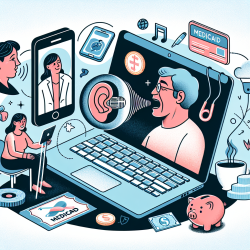As practitioners dedicated to the well-being of our young patients, it is crucial to stay informed about innovative approaches that can enhance our practice. One such approach is telepractice, particularly in the treatment of Vocal Cord Dysfunction (VCD). A recent study, Speech Therapy Telepractice for Vocal Cord Dysfunction (VCD): MaineCare (Medicaid) Cost Savings, sheds light on the significant benefits of using telepractice for VCD treatment.
Understanding Vocal Cord Dysfunction (VCD)
VCD is an abnormal spasm of the vocal folds that blocks the airway, making inhalation difficult or impossible. This condition often leads to heightened anxiety and can be mistaken for asthma, resulting in unnecessary treatments and medical costs. Proper diagnosis and treatment by a speech-language pathologist can provide significant relief.
The Power of Telepractice
The study conducted at Waldo County General Hospital (WCGH) demonstrated that telepractice could be a game-changer for treating VCD. Here are some key findings:
- Telepractice led to a first-month cost savings of $2376.72 for MaineCare, a 72% reduction in medical expenses.
- Patients treated via telepractice experienced successful outcomes, eliminating the need for further medical tests, medications, and emergency room visits.
- Patients remained symptom-free at the one-year follow-up.
Why Telepractice Works
Telepractice offers several advantages:
- Reduces travel time and costs for patients.
- Provides access to specialized care, regardless of geographic location.
- Facilitates consistent follow-up and monitoring.
Implementing Telepractice in Your Practice
To improve your skills and outcomes, consider incorporating telepractice into your treatment plans for VCD and other conditions. Here are some steps to get started:
- Familiarize yourself with telepractice technology and platforms.
- Ensure you have the necessary equipment and a stable internet connection.
- Train your staff and patients on how to use telepractice effectively.
- Monitor and evaluate patient outcomes to continuously improve your telepractice approach.
By embracing telepractice, you can provide high-quality care to your patients while reducing costs and improving accessibility.
To read the original research paper, please follow this link: Speech Therapy Telepractice for Vocal Cord Dysfunction (VCD): MaineCare (Medicaid) Cost Savings.










